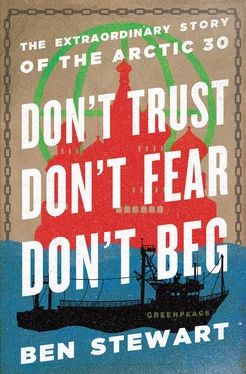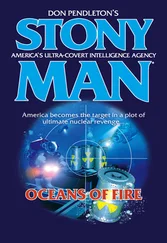Bowing to public pressure, Shell announced it was suspending its Arctic operation. [59] http://www.ft.com/cms/s/0/486a34d4-898a-11e3-abc4-00144feab7de.html#slide0
That left Gazprom. Putin’s oil giant announced that it was determined to become the first company to pump oil from the icy waters of the Arctic.
The Prirazlomnaya was by now thirty years old. Its base had spent years rusting in a shipyard before being moved to Murmansk and capped with the scrap parts of a decommissioned North Sea rig. [60] http://www.greenpeace.org/international/en/news/Blogs/makingwaves/10-reasons-to-take-action-to-stop-gazproms-pr/blog/46766/
Against Arctic Council guidelines, Gazprom refused to publish its plan to clean up any spill. [61] http://www.greenpeace.org/international/en/news/Blogs/makingwaves/10-reasons-to-take-action-to-stop-gazproms-pr/blog/46766/
A short summary – posted on its website before being removed by the company [62] http://shelf-neft.gazprom.ru/en/?type=larn
– revealed that Gazprom was ill-equipped to clean up a spill on the scale of Deepwater Horizon . [63] http://www.greenpeace.org/international/en/news/Blogs/makingwaves/10-reasons-to-take-action-to-stop-gazproms-pr/blog/46766/
But that summer they were going to drill again anyway.
At Greenpeace a team was assembled to organise a return to the Prirazlomnaya. Sini volunteered to climb the platform again. Pete Willcox offered to skipper the expedition. Across the world sailors and activists were emailed and asked if they were prepared to join the Sunrise and sail for the Arctic on a mission to take on Gazprom.
Daniel Simons is being harassed by the secret police.
There’s nearly always a car posted outside his legal headquarters in Murmansk. The two men in the front seats are wearing leather jackets and have Bill Gates haircuts. They take photographs of him and his colleagues, or observe them through the car window before scribbling in notebooks.
One night he’s heading back to the hotel where he’s staying. It’s 1 a.m. He crosses the street and bends down at the car window.
‘I’m going home now. Have a nice evening.’
The man at the steering wheel says nothing. Instead he pulls a pen from the inside pocket of his black jacket and writes something in his little book.
‘Good night then,’ says Simons.
The men stare straight ahead through the windscreen in silence.
Simons has been a Greenpeace lawyer for six years. He’s thirty-three years old and lives in Amsterdam but speaks Russian. After breaking off his holiday in Venice he rushed to Murmansk to recruit a legal team to defend the Arctic 30.
From the day after the Sunrise arrived in Murmansk, the Greenpeace team sees armed men in balaclavas wandering around town. Sometimes the men sit in the lobby of the hotel they’re staying in. Sometimes they follow Simons and his friends in the street. It’s the same guys who were standing guard outside the Investigative Committee that first night.
One night he’s walking home when he hears the sound of crunching grit. He turns around. It’s a taxi. A minute later it’s still there, crawling along the road behind him. He approaches the taxi. The car drives away, but soon afterwards it passes him. Then a couple of minutes later it passes him again. It’s driving in circles around him. His phone rings in his pocket, just for a second before the caller hangs up. Then it rings again. Two different Russian numbers that Simons doesn’t recognise. It’s past midnight. He has a brand-new SIM card. It’s obvious what’s happening here. The FSB is trying to link that SIM card to him, to check what his number is.
Two weeks have passed since commandos stormed the Arctic Sunrise , and by now one million people have written to Russian embassies around the world calling for the release of the crew. An Emergency Day of Solidarity sees 135 protests in forty-five countries across the globe. [64] http://www.greenpeace.org/international/en/press/releases/Emergency-solidarity-protests-worldwide-to-free-journalists-and-Greenpeace-activists-held-in-Russian-prison/
There are demonstrations in the Russian cities of St Petersburg, Murmansk and Omsk. In Moscow there are pickets in front of the Kremlin and the FSB headquarters, and a protest in Gorky Park attended by the families of Roman, Andrey and the ship’s 37-year-old Russian doctor, Katya Zaspa. Hundreds of people gather at the main harbour in Hong Kong to form a human banner that reads ‘Free the Arctic 30’. In South Africa protesters come together at former apartheid detention centres. In Madrid supporters gather in Puerta del Sol with a replica of the Arctic Sunrise . In Senegal fishermen take to their boats to protest at sea in an act of solidarity. A year earlier they welcomed the Sunrise on its mission to preserve their fishing grounds from Western industrial trawlers. Now they’re returning the favour.
Russian citizens have been officially complaining to the Investigative Committee and the General Prosecutor’s office about the detention of the activists. They have to provide their personal information to make a complaint – their home address and phone number – and that puts them at risk of retaliation from the authorities. Nevertheless, thousands are registering their support for the Sunrise crew.
There are four global hubs from where the campaign is being run – Moscow, London, Copenhagen and Amsterdam. In London the Arctic 30 team has set up shop in a basement space at the Greenpeace office, and soon enough it resembles a cross between a teenager’s bedroom and a military command HQ. From 7 a.m. until close to midnight the team sits hunched over computer screens, stuffing various iterations of fructose sugar into their mouths. On the wall there are three cheap clocks above childish hand-drawn flags – British, Dutch and Russian.
The campaigners’ collective mental state is one of permanent kinetic stress, like that moment when the car in front brakes suddenly and a surge of fear floods the very centre of your brain. It’s a constant communal condition, and soon enough their bunker is dubbed the Room of Doom.
The London hub is connected via a permanent video link to Mads Christensen’s office in Copenhagen. Opposite him sits his wife Nora, the leader of the Arctic campaign before the arrests. She is now responsible for overseeing staff across the world working for the crew’s release. The two of them make a formidable team. By 7 a.m. when London switches on the video link, the Christensens are at their desks discussing strategy for the day, having already got their two kids fed, dressed and into school.
At 10 a.m. every day, Copenhagen time, there is a core-team meeting. Faces from across the world appear in boxes on the screen: political operatives Neil Hamilton and Ruth Davis updating everyone on their dealings with governments; legal chief Jasper Teulings in Amsterdam giving the latest on his efforts to persuade the Dutch government to bring a case before the International Tribunal for the Law of the Sea; Rachel Murray, in charge of family liaison, relaying conversations she’s having with relatives of the thirty; Ben Ayliffe discussing plans for demonstrations, vigils and direct actions; James Turner and Iris Andrews in Los Angeles talking about the involvement of filmmakers and celebrities in the campaign; Fabien Rondal with the latest from Murmansk; and the head of the media operation giving details of the massive publicity campaign being orchestrated across the globe.
This team is now manoeuvring a global campaign involving several hundred people working full-time across forty countries. Ensuring they all work to the same political, legal and communications strategies requires a huge effort of co-ordination that is unprecedented in Greenpeace history. The team leaders find themselves on eighteen different Skype chats – online discussion groups for press officers, legal strategists, family liaison, and every other subset of the campaign. The groups are indispensable tools for sharing information and enforcing discipline amid the fear that somebody somewhere might say something that crashes the legal strategy or offends a key national government. All campaigns involve risk, but with the freedom of their friends at stake, the sense of personal responsibility is sometimes overwhelming.
Читать дальше












